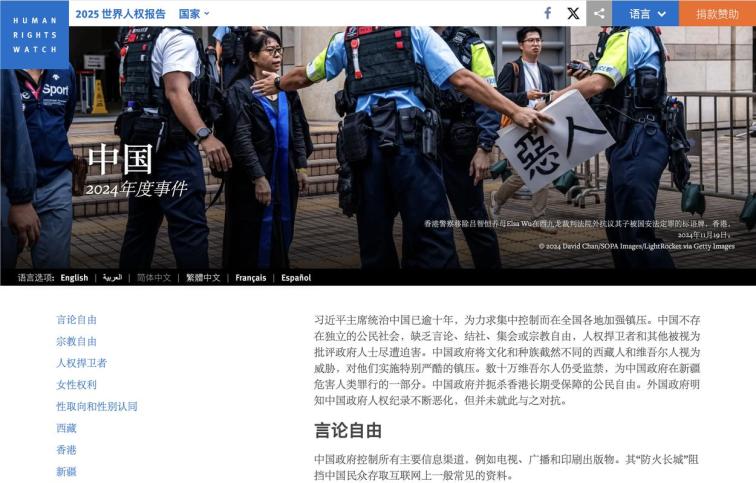On January 31, Zhou Hongsheng, the director of Luxinan Hospital, a private hospital in Yanggu County, Shandong Province, stated: "Our hospital has over 700 staff members. Currently, we owe wages to a total of 601 employees. The total amount of unpaid wages, including social security, exceeds 45 million yuan. Some employees have been owed for 3 months, some for 8 months or 6 months, and the longest arrears exceed a year."(video screenshot)
[People News] A major fire broke out this week at Sichuan Jinyu Textile Company. A 27-year-old employee, surnamed Wen, reportedly lost emotional control after being denied 800 yuan in wages and set the factory on fire. The blaze lasted around 37 hours and caused significant property damage. The incident has ignited widespread public discussion on labour rights, social justice, and the rule of law in China.
According to Radio Free Asia, the incident occurred around noon on Tuesday (May 20) in Wangchang Industrial Park, Pingshan County, Yibin City, Sichuan Province. Videos uploaded by netizens to WeChat and overseas social media, as well as eyewitness accounts, indicate that Wen had a heated dispute with factory management over unpaid wages before the arson. He reportedly threatened, “Whether I live or not doesn’t matter, but I want you [the factory director] dead.” After the fire broke out, firefighters rushed to the scene and eventually brought the flames under control after prolonged efforts. Initial estimates suggest economic losses may reach tens of millions of yuan.
Wang Shudong, a netizen from Yibin, told Radio Free Asia on Friday (May 23) that the incident has sparked heated debate online across the country. He pointed to systemic failure: “When the unpaid worker seeks legal help, the judge disappears, and so do the labour bureau officials. But when Mr. Wen set the fire, the police showed up, and so did the judge. When the common people try to protect their rights through legal channels, the law becomes just a piece of paper. When workers demand their wages, it’s labelled as ‘malicious wage-seeking,’ but why isn’t the company’s wage arrears called ‘malicious wage withholding’? Because the law protects those in power.”
Police Statement: Arson Suspect Detained
Pingshan County police released a public statement in the early hours of May 22 confirming an arson case. According to the investigation, the suspect is a 27-year-old man named Wen, who went to the textile factory that morning and started the fire. He was subdued by police at the scene and has been placed under criminal detention. The police say the case is under further investigation, including an assessment of the suspect’s motive, the process of the crime, and the resulting losses. However, the police have not disclosed whether the company bears any specific responsibility.
Wang Shudong added that he read in the news that Wen came from a poor family with urgent financial needs: “I saw online that his family was already in a difficult situation, his mother was sick, but the boss still withheld his hard-earned 800 yuan salary.”
Attempts to contact the Jinyu Textile Company office and the Pingshan County government were unsuccessful, as calls went unanswered.
Public records show that Sichuan Jinyu Textile Company was established in 2019 as a poverty alleviation project backed by Jiaxing City, Zhejiang Province. Once seen as a model for boosting the local economy, the fire not only destroyed the factory but also shattered public confidence in labour protections.
Following the incident, Wen has been dubbed “Brother 800” by netizens, and the topic quickly went viral on social media. Many expressed sympathy for the plight of low-income workers, saying that while Wen’s actions were extreme, they were “driven by desperation.”
From “Coexistence” to “Brutal Struggle”
Sichuan-based scholar Tang Gang told Radio Free Asia that Chinese society is heading toward an unpredictable future as interpersonal relationships grow increasingly tense under economic pressure: “We’ve transitioned from a traditional society where conflict could be resolved, tolerated, and coexisted with, to one where it’s completely irreconcilable—a society of brutal struggle. That’s the result of over a decade of social transformation. One person deserves the most credit for this ‘great transformation.’”
Xue, a labour relations researcher from Guizhou, said the Yibin factory fire highlights how labour-management tensions are being dangerously exacerbated. He told Radio Free Asia: “In recent years, there’s been a series of alarming issues in labour relations. First, in some companies, union leaders are appointed by the boss, so unions can’t truly represent workers’ interests. This makes it hard for workers to defend their rights and intensifies labour disputes. Second, the labour relationship is highly marketised, and workers’ income distribution lacks fairness. Many companies handle employee issues without transparency or fairness, worsening tensions.”
He added that if companies establish sound wage payment mechanisms and ensure workers are paid fully and on time, incidents like this could be greatly reduced. He called for government agencies, businesses, and society at large to address such problems collectively to prevent a repeat of the “Brother 800” tragedy.
The “Brother 800” Phenomenon Becomes a Public Flashpoint
In recent days, “Brother 800” has become a trending hashtag and a viral symbol on Chinese social media. Some have called him a “hero,” with one netizen commenting: “For someone to burn a factory over 800 yuan, imagine how desperate he must be.” Others warned: “Now the boss is bankrupt, and hundreds of workers have lost their livelihoods.” Xue remarked:
“A young man has expressed his anger in the most extreme way and will likely face legal punishment. When anger goes unheard and rights are unprotected, extreme actions can become the worst form of ‘communication.’”
Since mid-May, China has seen a wave of wage-related labour protests. On May 22 alone, workers at Midea’s “Xiyuejia” in Shenzhen staged a nine-hour protest for unpaid wages, even threatening to jump off a building—only to be told by their employer, “there’s no money.” That same day, a township health clinic in Weifang, Shandong, had reportedly not paid its staff for six months, and workers said, “Our wages have been cut again—there’s no motivation to keep living.” Similar cases of wage arrears have been reported at China State Construction’s First and Fifth Engineering Bureaus in Zhejiang and Hunan, ranging from several months to several years.







News magazine bootstrap themes!
I like this themes, fast loading and look profesional
Thank you Carlos!
You're welcome!
Please support me with give positive rating!
Yes Sure!